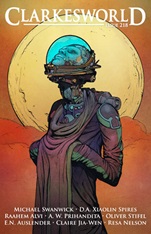 Clarkesworld #218, November 2024
Clarkesworld #218, November 2024
“LuvHome TM” by Resa Nelson
“Mirror Stages” by Claire Jia-Wen
“Luminous Glass, Vibrant Seeds” by D. A. Xiaolin Spires
“Negative Scholarship on the Fifth State of Being” by A. W. Prihandita
“Duty of Care” by E. N. Auslender
“The Slide” by Oliver Stifel
“Technicolor Bath” by Raahem Alvi
“Unquiet Graves” by Michael Swanwick
Reviewed by Mina
“LuvHome TM” by Resa Nelson starts with a woman getting locked out of her home by its interactive AI. It has decided that Dyna needs to get out of bed, eat food that isn’t take-out, exercise and meet people. Dyna resists but ends up capitulating. On her way back after a swim, she meets another woman locked out by her nanny-like AI in an attempt to combat her depression and isolation. Dyna extends a hand of friendship. On the surface, not much happens but it is a touching tale that asks: can your home love you?
As an aside, an audio recording is provided of this tale and it was well done.
“Mirror Stages” by Claire Jia-Wen is utterly depressing and the fragmented style makes it difficult to read. It’s the story of a poor girl who sells her body for food to a company working with immersion reality. She is used and consumed by others, till she can no longer recognise herself. A grim look at exploitation and alienation.
“Luminous Glass, Vibrant Seeds” by D. A. Xiaolin Spires presents us with a world dealing with disastrous climate change. Xinru creates artistic pieces made from recycled glass in this world: “Glass is fluid, indeterminate. It goes through an extreme transformation under heat. I can’t help but identify with it . . .” She gets asked by her commune sister to (illegally) transport an emmer seedling using Haru, her security, glass assistant, and annealer droid (I learned a new word today, anneal!). It needs to be transported to another commune with the right climate and willing to share the results of growing it. Viable seeds, capable of reproduction are rare in this world. This is not a tale full of suspense, the seedling is successfully transported and Haru even finds a forgotten seed bank along the way; it’s a tale focused much more on world building, as we see what other members of Xinru’s family are busy doing. A surprisingly upbeat take on ecological disaster; much less depressing than the film “Vesper”.
“Negative Scholarship on the Fifth State of Being” by A. W. Prihandita is a beautiful story. Semau is a practitioner-doctor, meaning she is only there to ask questions and enter the answers into the diagnostic health model. She is not allowed to carry out independent diagnoses. One day, a plyzmorynox, a member of a species almost wiped out by genocide consults her about an issue the health model cannot diagnose. Slowly, they realise that the interpreting machine has limits and what the plyzmorynox Txyzna needs is a spiritual helper for his transition from childhood to adulthood. He needs someone to hear his song about the unique state of his heart. Semau agrees to help him even though she risks a disciplinary hearing: “It surprised her how little effort it took to understand Txyzna, once she accepted she didn’t need to understand him, only to hold space for him.” Semau finds the courage to think independently and the story feels particularly relevant in the face of unquestioning enthusiasm for GenAI, with little consideration of the limits and potential abuses.
In “Duty of Care” by E. N. Auslender, Asher and Madeleine are the last people left on an Earth knocked out of the solar system by a rogue planet. They are cared for by an AI governed by rules that we are given one at a time as the story progresses. As Asher discovers what truly happened in the past, he must decide what to do about the future. A morally complex tale with an AI given more shades of grey than usual, thereby making it more interesting.
“The Slide” by Oliver Stifel puts us in the middle of a murky geopolitical situation. Alex is a successful rally driver, motivated by the promise he made to his brother, Gregor, who died in the war against Brazil. As the story progresses, Alex begins to discover that the war is not what it seems. And he begins to question the role of the huge rally machine in fuelling a war for the profit of a corrupt government. But Alex has a conscience and must decide how to act: to get out of a slide you have to floor it.
“Technicolor Bath” by Raahem Alvi requires patience. It’s a bit like when I read The English Patient and realised I had missed a main character dying three pages earlier because of the oblique, poetic style. Neha pays to have a digital copy made of her dead wife’s consciousness. But it is only a shadow of Sumaira. The tragedy is that Neha can’t love the copy and the copy feels it. It’s a reflection on identity, death, love and letting go. Don’t give up, read it to the end, then read it again and it will make sense.
“Unquiet Graves” by Michael Swanwick is another look at digital copies of the dead. George visits the cemetery to talk to the digital copies of his father and wife. Then things take on a different turn but you’ll have to read the story to find out what that is. The humour is coal black.